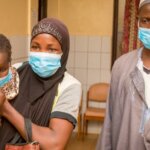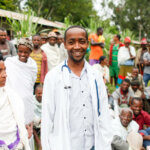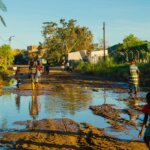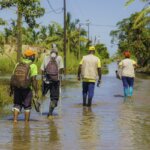- Humanitarian Action
COVID-19 is a challenge on an unprecedented scale. In this Q&A session Rupert Roniger, CEO, provides insights into Light for the World’s own response strategy.
Q. What were the organisation’s first steps following news of the Covid-19 crisis?
Rupert Roniger. In March, our first priority was our team members – ensuring they were safe, supported, connected and able to remain impactful. We realised that only if we are able to protect our staff and our partners, would we be able to take action to protect our beneficiaries too. So, we followed measures recommended by the WHO to prevent the spread of COVID-19, including travel restrictions & remote working wherever possible. It’s been a time of adaptation, with our entire team now working remotely, but I think we have coped well.
What came next?
Next we had to work out our urgent programme and advocacy response to the crisis. This was a major concern because we were – and are – aware that low income countries where we work, especially in Sub-Sahara Africa, are at particular risk.
Why are low income countries at increased risk?
Several factors increase the threat for low-income countries including: weak health systems, lack of clean water, cities with high population densities, many family members living in single households, the levels of malnutrition and chronic diseases, and a high share of the population earning their living with low-paid day labour or informal micro-businesses with literally no reserves to fall back on.
In Europe the increase in the number of intensive care unit beds and ventilators has been a race against the clock. Yet the challenge is even greater for low-income countries. For example, in Burkina Faso there are only 10 intensive care beds for a population of more than 20 million people. In Uganda there are only 55 intensive care beds for almost 43 million people.
On March 19th, 2020 the director general of the World Health Organisation, Dr. Tedros Adhanom Ghebreyesus, told Africa to “prepare for the worst” and “prepare as soon as possible”. But how can African governments do this with such limited resources?
What overall approach did Light for the World decide on?
I’m proud that in super-quick time, and with outstanding team-work from colleagues across the globe, we were able to set-up a rapid response strategy. To summarise, on behalf of my colleague Sander Schot, Programme Manager for Humanitarian Response, the five pillars of this response strategy are:
1. Provide our project partners with support in the implementation of preventive measures.
2. Support people with disabilities with urgently needed supplies and food, and livelihood options.
3. Develop concrete support measures to strengthen the health systems – giving special attention to people with disabilities and those with chronic diseases in the countries where we work.
4. Call on governments and support them to ensure disability-inclusive, accessible disaster response.
5. Protect our teams and at the same time remain fully operational as an organisation.

Officially confirmed infection numbers in African countries remain quite low while it is assumed that there is a high incidence of unreported cases due to very limited testing capacities. How does Light for the World deal with these numerous uncertainties?
Yes, the future is hard to predict. Even the UN’s Global Humanitarian Response Plan uses two scenarios, one for three to four months, and another counting on a period until at least the end of 2020. Given this, we follow an adaptive programming logic. We plan activities up to 3-6 months, after which we review and update our planning again.
What is clear is that the pandemic has arrived in all the countries where we work and testing capacity is very limited. What’s more, even in a post-crisis situation there will be economic consequences which may need us to shift more attention to people’s recovery of their livelihoods.
What is the economic impact on livelihoods in Africa likely to be?
Unfortunately, all signs point towards a massive impact. So the shock to people’s livelihoods – especially in low income countries – could be devastating. It’s a huge concern. People are already suffering. One caregiver in Laikipia, Kenya, told us: “My child with Cerebral palsy is on epileptic drugs. He has had recurrent seizures since the COVID-19 crisis began. I used to get funds for his medicine from my small grocery business, I was forced to close it and now I don’t have anywhere to get funds from.”
What reports are you getting from your colleagues in Burkina Faso, DRC, Ethiopia, Mozambique, Uganda, South Sudan and beyond?
Our colleagues our very worried. As Elie Bagbila, Country Director of Light for the World in Burkina Faso, told me: “No country in the world is ready to take care of COVID-19. It is a pandemic. African governments are working hard to protect their people. But our health systems need urgent support.”
Covid-19 is a threat for sure. But it’s also the indirect consequences of the virus which are already causing havoc. Geoffrey Wabulembo, our Medical Director for Eye Health & NTDs, who is based in Uganda reports: “Right now, health workers are avoiding patients because of lack of enough personal protection equipment. The wider effect of this is that people are dying from a lot of other diseases other than Covid-19.”

For countries who have recently suffered natural disasters, is the situation even more tense?
Sadly, yes. I quote our colleague Zicai Zacarias, Country Director of Light for the World in Mozambique who has been working to support victims of the devastating impact of Cyclone Idai and the subsequent floods over the past year: “People with disabilities in the Búzi District of Mozambique are again in dire need of food. Some are starving. Our colleagues there are now urgently preparing food distribution help to cover the next two months.”
Is information about Covid-19 reaching the poorest and hardest to reach?
No. This is a major issue! Robert, a Disability Inclusion Facilitator for Light for the World in Kampala, Uganda told us that: “Access to timely and accurate information in this time of coronavirus is one of the greatest challenges faced by people with hearing impairments. The latest myth that is causing panic in my community is about (5G) mobile internet causing or spreading coronavirus. This is not true!”
We are urgently doing all we can to disseminate accessible information to those who need it where we work. Prevention is better than cure.
What about medical supplies?
Providing doctors and nurses with basic equipment is the least we can do to support their heroic efforts through these challenging times. On 7th April, we were able to deliver urgently needed 150 protective suits, 1300 caps, 1,520 litres of sanitizer solution and 10 pedal driven disinfectant stands to the Entebbe Regional Referral Hospital in Uganda. Thirty confirmed Covid-19 patients are hospitalised and cared for there by director Dr. Muwanga Moses and his dedicated team. We will continue to support medical colleagues and hospitals wherever we can.
Finally, what makes Light for the World ready to respond to the massive challenges that Covid-19 presents?
No organisation or individual was ready for this! But through Light for the World’s work on eye health and rehabilitation for people with disabilities, we do know how important strong health systems are – and we know what steps need to be taken to strengthen them to reach the poorest and most vulnerable.
We have broad experience in fighting infectious diseases – implementing programmes against Neglected Tropical Diseases reaching out to more than 5 million people in Northern Ethiopia. But – perhaps more important than any of this – we recognize that together we are stronger. We work with the best partners in our programme countries, who know the local context better than anyone.
We also have very good relationships with the Ministry of Health, government hospitals and regional health bureaus in our partner countries in Africa, namely in Ethiopia, Burkina Faso, Mozambique, Uganda and South Sudan.
This crisis requires a global, concerted, coordinated response. Impact through partnership has always been a part of Light for the World’s DNA!



